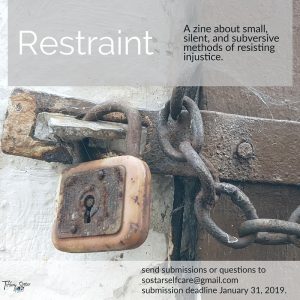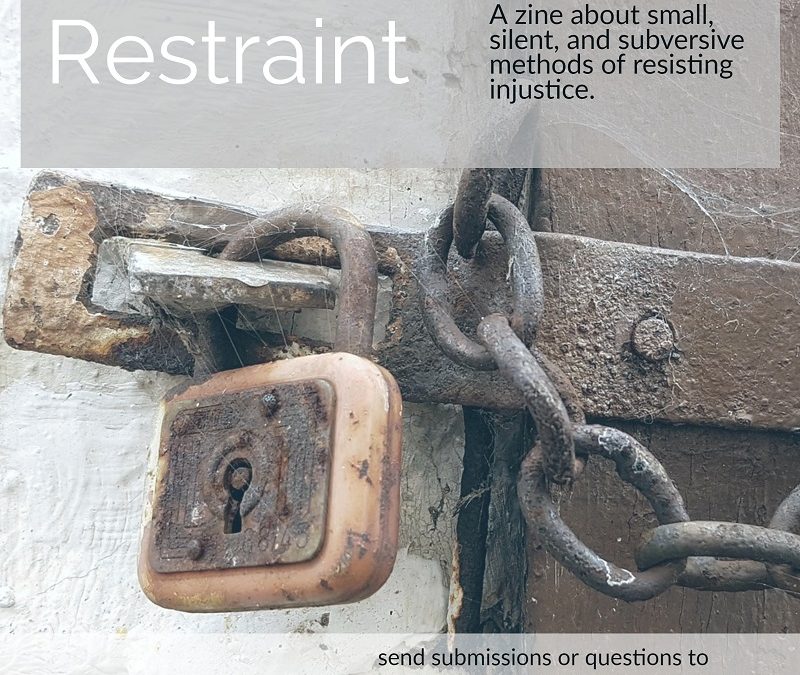Image description: A rusty lock and chain on a wooden door. Text reads “Restraint: A zine about small, silent, and subversive methods of responding to injustice. Send submissions or questions to sostarselfcare@gmail.com. Submission deadline January 31, 2019.”
1. a measure or condition that keeps someone or something under control or within limits.
How do we experience restraint?
How do we resist injustice?
How do we break free, break open, break stigma, break barriers?
Many of us are resisting injustice from a place of external or internal restraint. Either being controlled or controlling ourselves, or both.
We may not “come out” because it wouldn’t be safe, or because it isn’t the way we want to move through our world, or because it would jeopardize our relationships or our work.
We may not “speak up” to bullying, abuse, or injustice because it would put our career in danger, or it would put people we love in harm’s way, or because other people have power over us and we can’t afford to antagonize them, or because we have other ways of resisting those injustices.
(Disabled folks who can’t speak up to injustices committed by their carers because of the power differential, racialized folks who can’t speak up to injustices in the office because they’ll be labelled “angry”, trans folks who can’t speak up to injustices in the medical community because it would put their access to transition support in jeopardy – there are so many of these situations!)
But despite these restraints, people are never passive recipients of trauma or injustice. As David Denborough says in the Charter of Storytelling Rights, “Everyone has the right for their responses to trauma to be acknowledged. No one is a passive recipient of trauma. People always respond. People always protest injustice.”
There are many ways to resist, challenge, and respond to injustice.
This zine celebrates and recognizes the small, silent, and subversive responses to injustice.
It is inspired by the April Possibilities bi+ community discussion of “the closet”, and by the March Self-Care Salon discussion about being a professional on the margins, as well as other conversations and experiences of restraint (both restraint that is painful and externally imposed, and restraint that is joyful and internally chosen).
Do you have a story of restraint?
Send your submissions of art, comics, short fiction, non-fiction, poetry, or essay to sostarselfcare@gmail.com before January 31, 2019. You can also send your questions.
(Depending on the number, size, and content of submissions, some may be edited. Nothing will be put into the final zine altered without the author’s consent.)
The holiday season means that a lot of folks are operating under imposed restraints – “don’t talk about politics” / “don’t bring your other partner” / “don’t talk about your sexuality” / “don’t make a fuss”.
This zine got slipped over to the backburner while I was working on my masters degree, but it’s the season for small, silent, and subversive methods of resisting injustice, so let’s do this!!!
I want to hear your stories.
They don’t have to be related to the holiday season (this zine won’t be complete this month either way).
If you want help telling your story, I can interview you!
I find myself very conscious of Unspeakable Things right now – the things that we are not allowed to talk about because other people have imposed restrictions on our speech. Seemed like a good time to share this again and invite your participation. <3


